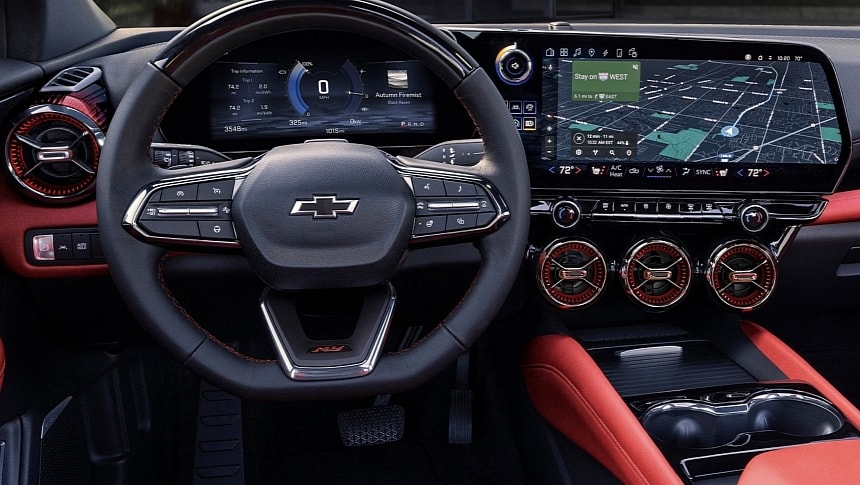Edward Kummer, the man behind General Motors' controversial anti-CarPlay and Android Auto strategy, has decided to leave the company.
The departure is part of a massive software reorganization happening within the American carmaker, so maybe, just maybe, GM's planned transition to a world without phone mirroring software in its cars isn't working exactly as expected.
Chief Digital Officer Edward Kummer is the second big departure after Mike Abbott, executive vice president of Software and Services, left the carmaker.
Kummer joined General Motors in the fall of 2021, and his role was to accelerate GM's digital transformation with a focus on consumer software. Despite this increased consumer focus, Kummer's biggest change was a proposed (and eventually adopted) transition from phone mirroring software to embedded operating systems.
Under Kummer's umbrella, GM abandoned CarPlay and Android Auto to adopt Android Automotive, promising an upgraded experience with capabilities that wouldn't otherwise be available with phone mirroring platforms.
The decision was received with mixed reactions by GM's customer base, with some long-time buyers claiming they'd leave the brand unless the company brought back CarPlay. However, GM's Android Automotive strategy came into effect with the debut of the 2024 Blazer EV, with CarPlay and Android Auto no longer allowed in any new electric vehicle. Models with combustion engines will continue to offer the two systems, albeit only for a limited time, as GM plans to switch entirely to EVs by 2035.
GM has the technical means to offer Android Automotive alongside CarPlay and Android Auto, as the operating system supports enabling phone mirroring systems if the carmaker allows it. Polestar and other carmakers embraced this approach to "give customers the choice," but GM said it had to enforce Android Automotive to ensure an upgraded experience in its vehicles.
Critics blasted GM for the aggressive transition to Android Automotive, claiming the move was necessary specifically to pave the way for subscriptions.
Meanwhile, Android Auto and CarPlay remain amazingly popular worldwide, with most carmakers, including GM's American rivals, sticking with the two systems in new models. Ford was one of the companies that rushed to express their commitment to offering CarPlay and Android Auto in future models.
Apple's data indicates that CarPlay has become a must-have piece of equipment in new cars. The company shared figures to reveal that nearly eight in ten new-car buyers in the United States would give up on purchasing a vehicle without CarPlay.
The company is also working on the second-generation CarPlay, which is expected to record en-masse adoption in the automotive space. Porsche and Aston Martin will install the new system on their first cars launching this year, with other big names in the industry expected to adopt CarPlay 2.0 in the coming years. Apple will likely unveil new names to offer CarPlay in their future models in the spring at WWDC.
Chief Digital Officer Edward Kummer is the second big departure after Mike Abbott, executive vice president of Software and Services, left the carmaker.
Kummer joined General Motors in the fall of 2021, and his role was to accelerate GM's digital transformation with a focus on consumer software. Despite this increased consumer focus, Kummer's biggest change was a proposed (and eventually adopted) transition from phone mirroring software to embedded operating systems.
Under Kummer's umbrella, GM abandoned CarPlay and Android Auto to adopt Android Automotive, promising an upgraded experience with capabilities that wouldn't otherwise be available with phone mirroring platforms.
The decision was received with mixed reactions by GM's customer base, with some long-time buyers claiming they'd leave the brand unless the company brought back CarPlay. However, GM's Android Automotive strategy came into effect with the debut of the 2024 Blazer EV, with CarPlay and Android Auto no longer allowed in any new electric vehicle. Models with combustion engines will continue to offer the two systems, albeit only for a limited time, as GM plans to switch entirely to EVs by 2035.
GM has the technical means to offer Android Automotive alongside CarPlay and Android Auto, as the operating system supports enabling phone mirroring systems if the carmaker allows it. Polestar and other carmakers embraced this approach to "give customers the choice," but GM said it had to enforce Android Automotive to ensure an upgraded experience in its vehicles.
Critics blasted GM for the aggressive transition to Android Automotive, claiming the move was necessary specifically to pave the way for subscriptions.
Meanwhile, Android Auto and CarPlay remain amazingly popular worldwide, with most carmakers, including GM's American rivals, sticking with the two systems in new models. Ford was one of the companies that rushed to express their commitment to offering CarPlay and Android Auto in future models.
Apple's data indicates that CarPlay has become a must-have piece of equipment in new cars. The company shared figures to reveal that nearly eight in ten new-car buyers in the United States would give up on purchasing a vehicle without CarPlay.
The company is also working on the second-generation CarPlay, which is expected to record en-masse adoption in the automotive space. Porsche and Aston Martin will install the new system on their first cars launching this year, with other big names in the industry expected to adopt CarPlay 2.0 in the coming years. Apple will likely unveil new names to offer CarPlay in their future models in the spring at WWDC.







